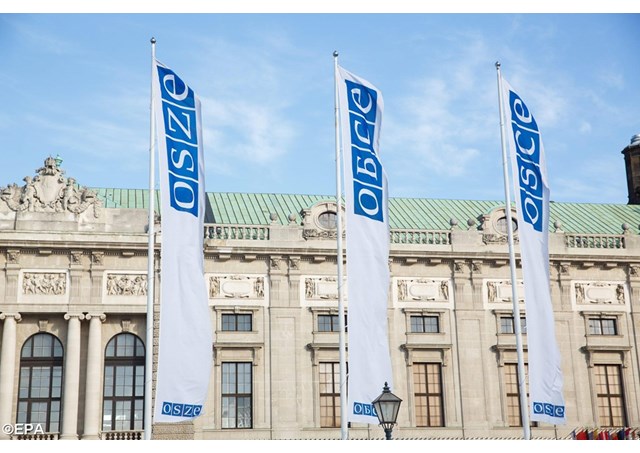
Holy See: Religious freedom important, in peace and war

(Vatican Radio) The Vatican on Wednesday praised the role of military chaplains during a meeting on the subject organized by the Organization for Security and Co-operation in Europe (OSCE).
“War always leaves a permanent mark upon a human being, it disfigures not only bonds among brothers and nations, but it also disfigures soldiers who have witnessed the atrocities that war causes,” said Monsignor Janusz Urbańczyk, the Permanent Observer of the Holy See to the OSCE.
“Thus, the Church sends military chaplains to accompany military personnel in every situation and context, to support them as well as being with them in their daily work and to serve in every moment their spiritual needs, while also assisting their understanding of the centrality of human beings and the common good of the country where they serve,” he continued.
The Vatican diplomat also pointed out the importance of religious freedom, both in peacetime and in war.
“As a fundamental human right it should be enjoyed by every person, at every time, in any situation; therefore, also by everyone who serves in the Armed Forces, both in peacetime and in war,” – Msgr. Urbańczyk said – “If the Armed Forces are truly to reflect what our participating States strive to be, it behoves them to be exemplary in respecting those basic rights that we have rightly elevated to the title of ‘human rights’ first and foremost among their own personnel.”
The full statement is below
STATEMENT BY MONSIGNOR JANUSZ S. URBAŃCZYK
PERMANENT REPRESENTATIVE OF THE HOLY SEE,
AT THE 845th MEETING OF THE OSCE
FORUM FOR SECURITY CO-OPERATION
15 FEBRUARY 2017
RE: ROLE OF MILITARY CHAPLAINS IN THE ARMED FORCES AND THE FREEDOM OF BELIEF (IN PEACETIME OR AT WAR)
Mr. Chairman,
The Holy See would like to express its sincere gratitude to the Romanian FSC Chairmanship for organising – within the context of the Forum – a security dialogue on the “Role of military chaplains in the armed forces and the freedom of belief in peacetime or at war”, two issues of understandable importance to the Holy See. Let me also thank the speakers for their valuable contributions to our discussions.
The Catholic Church “has always wanted to provide with commendable promptness and proportionately to the various needs and the spiritual care of the military,”1 in peacetime as well as in times of war. War always leaves a permanent mark upon a human being, it disfigures not only bonds among brothers and nations, but it also disfigures soldiers who have witnessed the atrocities that war causes.2 Thus, the Church sends military chaplains to accompany military personnel in every situation and context, to support them as well as being with them in their daily work and to serve in every moment their spiritual needs, while also assisting their understanding of the centrality of human beings and the common good of the country where they serve. In this way, military personnel – sustained by chaplains – can have, as Pope John Paul II said, “the role of sentinel, who scans the horizon to avert danger and promote justice and peace everywhere [...] to put force at the service of the important values of life, of justice, of forgiveness and of freedom.”3
The concrete expression of this pastoral care for military personnel is the Military Ordinariate, a Church jurisdiction equivalent to a Diocese. An Ordinariate is established to provide sacramental and pastoral care of those serving in the Armed Forces and their families of a given country, led by a Bishop, following an international agreement with the given State. At present there are 36 such ecclesiastical jurisdictions in the world – including in 17 OSCE participating States – with more than 2,500 chaplains, serving as “faithful heralds of the truth of peace.”4 In addition, the Catholic Church in all countries stands ready to provide, through its Dioceses and parishes, sacramental and pastoral care to military personnel, assisting them in becoming “examples of Christian hope, which is the certitude of the victory of love over hate and of peace over war”.5
Finally, the Holy See values greatly the attention given by the FSC to the freedom of religion or belief, in peacetime and at war. Freedom of religion or belief is one of the fundamental human rights. Not only is it recognized as such by The Universal Declaration of Human Rights (art. 18), it is also listed among the Decalogue of the Helsinki Final Act (art 1, VI), and further safeguarded by subsequent commitments of this Organization. As a fundamental human right it should be enjoyed by every person, at every time, in any situation; therefore, also by everyone who serves in the Armed Forces, both in peacetime and in war. If the Armed Forces are truly to reflect what our participating States strive to be, it behoves them to be exemplary in respecting those basic rights that we have rightly elevated to the title of “human rights” first and foremost among their own personnel.
Thank you, Mr. Chairman.
1 His Holiness John Paul II, Apostolic Constitution Spirituali Militum Curae, 1.
2 Address of His Holiness Pope Francis in the fourth course for the formation of military chaplains on international humanitarian law promoted by the Pontifical Council for Justice and Peace, 26 October 2015.
3 Jubilee of the armed forces and the police, homily of His Holiness John Paul II, 19 November 2000. 2
4 Message of His Holiness Benedict XVI for the celebration of the World Day of Peace 2006.
5 Greeting of His Holiness Pope Francis to the participants in the Jubilee for the armed forces and law enforcement, 30 April 2016.
| All the contents on this site are copyrighted ©. |


